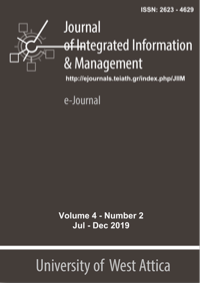Editorial

Abstract
The first paper presents, compares and discusses past and recent survey findings regarding the opinions of Archival, Library and Information Studied (ALIS) Department undergraduate, postgraduates’ students and faculty members about the use of ALIS eClass. One of the most interesting results of this study is the fact that recently registered members tend to use eClass more. The following paper presents a comparative automated text classification process, between DEVMAX.DF, a tool proposed by the authors and the classic TF.IDF, aiming to provide an accurate automated classification tool as an alternative to manual assignments. Embracing the multidisciplinary spectrum of the Information realm, which also includes physical preservation of valuable material, in the next paper, experts in this field will be informed of an important investigation on the artificial ageing of paper. This work reports that accelerated ageing of pure cellulose paper in sealed vessels results in an overall deterioration of important paper properties and that the evolution of pure cellulose paper properties can be modeled efficiently by using the equations presented in this paper. The last paper discusses a holistic, user-driven approach for the development of an innovative, open-access Educational Framework that includes six emerging information-related literacies: Critical Literacy focusing on inequalities, Digital Literacy, Mobile Literacy, Data Literacy, Media and Information Literacy and Sustainable Development Literacy. The Educational Framework of these literacies is based on the structural support offered by the various Information Literacy models and is addressed to educators and librarians. The proposed Educational Framework is a conceptually, strategically, technologically and educationally pioneering endeavor in answering specific urgent demands of the current Information and Knowledge Society.
Article Details
- How to Cite
-
Kouis, D. (2019). Editorial. Journal of Integrated Information Management, 4(2), 5–6. Retrieved from https://ejournals.epublishing.ekt.gr/index.php/jiim/article/view/37870
- Section
- Editorial

This work is licensed under a Creative Commons Attribution-NonCommercial 4.0 International License.
Copyright Notice
Authors who publish with JIIM agree to the following terms:
- Authors retain copyright and grant the journal right of first publication with the work simultaneously licensed under a Creative Commons Attribution Non-Commercial License that allows others to share the work with:
- An acknowledgment of the work's authorship and initial publication in this journal.
- Authors are permitted and encouraged to post their work online (preferably in institutional repositories or on their website) prior to and during the submission process, as it can lead to productive exchanges, as well as earlier and greater citation of published work.





